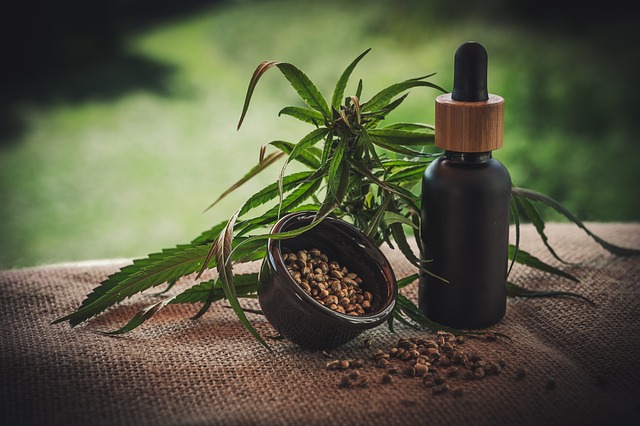TL;DR:
Soil quality, heavily influenced by heavy metals testing, is critical for producing high-potency, pure, and safe Cannabidiol (CBD) products. Regular testing detects toxic elements like lead, mercury, and cadmium that can accumulate from industrial activities or agricultural practices, posing risks to both plants and consumers. Advanced techniques like Atomic Absorption Spectrometry (AAS) and Inductively Coupled Plasma Mass Spectrometry (ICP-MS) ensure safety standards, regulatory compliance, and the protection of both consumer health and environmental integrity. Effective soil management for CBD cultivation includes best practices such as minimizing synthetic fertilizers, maintaining pH levels, monitoring moisture content, and crop rotation. Embracing future technologies like sensors, drones, and data analytics will enhance heavy metals testing, enabling safer, higher-quality CBD production.
Soil quality is a cornerstone of successful cannabis (CBD) cultivation, directly impacting plant health and product potency. This article delves into the intricate world of soil monitoring, focusing on heavy metals testing—a critical aspect for ensuring CBD safety and sustainability. We explore the impact of heavy metals on cannabis growth, discuss common sources, and review advanced techniques for detection. Additionally, we cover regulatory guidelines, best practices, and future trends shaping the industry’s approach to heavy metals testing for CBD production.
Understanding Soil Quality and its Impact on CBD Growth

Soil quality is a critical factor in determining the health and productivity of plants, including those used for Cannabidiol (CBD) production. Understanding soil health involves assessing various parameters such as nutrient levels, pH balance, organic matter content, and the presence or absence of pollutants like heavy metals. In the context of CBD cultivation, ensuring optimal soil quality is paramount because it directly influences the potency, purity, and overall yield of the final product.
Heavy Metals Testing for CBD plants is a crucial aspect of maintaining soil integrity. Heavy metals like lead, mercury, and cadmium can accumulate in soils due to various factors including industrial activities, agricultural practices, and natural geochemical processes. These metals are toxic to plants, stunting their growth and reducing the quality of the CBD extracts. Regular monitoring and testing for heavy metals help cultivators identify contaminated areas, implement remediation strategies, and ultimately produce safe and high-quality CBD products.
The Role of Heavy Metals in Soils and their Potential Hazards

Soil, a vital component in agriculture and environmental health, often harbors unseen elements that can significantly impact its quality and ecosystem. Among these invisible contaminants are heavy metals—a group of elements known for their toxicity and persistent presence in the environment. Heavy metals such as lead, mercury, cadmium, and arsenic, when introduced into soils, can pose severe hazards to plants, animals, and humans alike.
In the context of CBD (Cannabis) cultivation, heavy metals testing for CBD becomes crucial. These metals can accumulate in plants, potentially leading to harmful residues in CBD products. Given that heavy metal contamination is often subtle and insidious, regular monitoring and testing are essential. By employing advanced analytical techniques, farmers and producers can ensure the safety and purity of their crops, meeting regulatory standards and providing consumers with high-quality CBD products free from these potential hazards.
Why Test for Heavy Metals in CBD Production?

Testing for heavy metals is an essential aspect of CBD (Cannabis sativa L.) production, as it ensures product safety and quality. Heavy metals, such as lead, mercury, and cadmium, can contaminate soil, and subsequently, the cannabis plants growing in it. These metals are non-biodegradable and can accumulate in the plant tissue, posing potential health risks to consumers. In the context of CBD oil or other cannabis-derived products, even trace amounts of heavy metals can be concerning.
Heavy metals testing for CBD is critical to protect both consumers and the environment. It helps maintain strict quality control measures, ensuring that the final product meets safety standards. This testing process involves sophisticated analytical techniques to detect and quantify heavy metal impurities at extremely low levels. By implementing rigorous heavy metals testing procedures, CBD manufacturers can guarantee their products’ purity, effectiveness, and overall safety for consumption.
Common Heavy Metals Found in Soils and Their Sources

Soil, an essential component in agriculture and environmental health, often contains trace amounts of heavy metals, which can have detrimental effects on both plants and humans. These heavy metals are natural elements, but their presence in high concentrations is a cause for concern. Common heavy metals found in soils include lead, mercury, cadmium, arsenic, and zinc. Each of these metals has distinct sources and potential impacts.
Lead, for instance, can contaminate soil through historical practices like lead-based paint or fuel emissions. Mercury contamination often arises from industrial activities and natural geological processes. Cadmium finds its way into soils via atmospheric deposition from burning fossil fuels and certain industrial operations. Arsenic is a concern in some regions due to its use in pesticides and natural occurrence in certain geological settings. Lastly, zinc, although essential for plant growth in small amounts, can accumulate in soil due to human activities like agriculture and mining waste disposal. Heavy metals testing is crucial, especially in the context of CBD (Cannabis Sativa) cultivation, where monitoring soil quality ensures the production of safe and healthy plants.
Techniques and Methods for Heavy Metals Testing

To accurately monitor soil quality, especially in relation to CBD cultivation, Heavy Metals Testing is a crucial aspect. Techniques like Atomic Absorption Spectrometry (AAS) and Inductively Coupled Plasma Mass Spectrometry (ICP-MS) are commonly employed for their sensitivity and precision. These methods detect trace amounts of heavy metals such as lead, mercury, and cadmium, which can be toxic to cannabis plants and accumulate in the final product.
The process involves collecting soil samples, extracting relevant elements, and analyzing them using specialized equipment. By comparing results against established safety thresholds, farmers can ensure their CBD products are free from harmful metal contaminants. Regular Heavy Metals Testing is a proactive step towards maintaining high-quality standards and safeguarding both consumer health and the integrity of CBD brands.
Regulatory Considerations for Heavy Metal Contamination in Cannabis

In the rapidly growing cannabis industry, ensuring soil quality and safety is paramount, especially regarding heavy metal contamination. Regulatory considerations for heavy metals testing in cannabis are becoming increasingly stringent worldwide as consumers demand purity and safety in their CBD products. This is crucial given that heavy metals like lead, mercury, and arsenic can accumulate in cannabis plants from contaminated soils or fertilizers, posing potential health risks to consumers.
Heavy metals testing for CBD products has become a key focus for regulators and manufacturers alike. Strict guidelines now mandate regular monitoring of soil quality, including routine heavy metals analysis, to prevent any harmful residues from entering the food chain. As such, cannabis growers must employ robust practices and technologies to monitor and manage soil health effectively, ensuring compliance with these stringent regulations and maintaining the integrity of their CBD products.
Best Practices for Ensuring Soil Quality and Safety

To maintain optimal soil quality, especially in regions where cannabis (CBD) cultivation is prevalent, implementing best practices is paramount. Regular Heavy Metals Testing for CBD is a cornerstone of this process, as heavy metals like lead, mercury, and arsenic can accumulate in soil due to various factors such as industrial activities, agricultural runoff, or contaminated water sources. These toxins are harmful not only to plants but also to humans and animals if the contaminated produce enters the food chain.
Therefore, cultivators should adopt methods that ensure safe and sustainable soil management. This includes minimizing the use of synthetic fertilizers and pesticides, promoting organic matter addition through compost or manure, maintaining proper pH levels (ideally between 6.0 and 7.5), and regularly monitoring soil moisture content. Additionally, crop rotation can help prevent soil-borne diseases and reduce nutrient depletion, ensuring that each harvest maintains high quality standards while preserving the long-term health of the soil ecosystem.
Integrating Heavy Metals Testing into Sustainable Agriculture

In sustainable agriculture, integrating heavy metals testing is a crucial step toward ensuring the safety and quality of crops, especially in the context of emerging industries like CBD (Cannabis Sativa) cultivation. Heavy metals, such as lead, mercury, and cadmium, can accumulate in soil due to various factors including industrial activities, mining, and improper waste disposal. These contaminants pose significant risks to both human health and environmental ecosystems. Regular testing for heavy metals allows farmers to monitor their soil quality proactively. By identifying potential hotspots and implementing targeted remediation measures, they can mitigate the presence of these toxic elements.
For CBD producers, this is particularly important as heavy metals can contaminate final products, leading to regulatory issues and reputational damage. Integrating heavy metals testing into agricultural practices enables farmers to meet stringent quality standards and consumer expectations. Advanced analytical techniques, including inductively coupled plasma mass spectrometry (ICP-MS), provide highly sensitive detection methods, enabling the early identification and management of heavy metal residues in soil and crops. This proactive approach not only supports sustainable farming practices but also ensures the production of clean, safe, and high-quality CBD products.
Future Trends in Soil Monitoring and CBD Cultivation

As technology advances, future soil monitoring practices are expected to become more sophisticated and precise. The integration of innovative tools like sensors, drones, and advanced data analytics will revolutionize soil quality assessment. These technologies can provide real-time data on various parameters, including nutrient levels, pH balance, moisture content, and even trace elements like heavy metals, which is particularly crucial in the context of CBD cultivation. Heavy Metals Testing for CBD plants becomes more efficient and accessible with these advancements, ensuring the production of safe and high-quality cannabis products.
CBD farmers can leverage these trends to optimize their cultivation practices. By continuously monitoring soil health, they can make data-driven decisions regarding fertilization, irrigation, and pest control. This proactive approach not only enhances crop yield and quality but also promotes sustainable farming practices. With the increasing demand for CBD products, these future trends in soil monitoring will be instrumental in meeting market needs while maintaining environmental sustainability.
